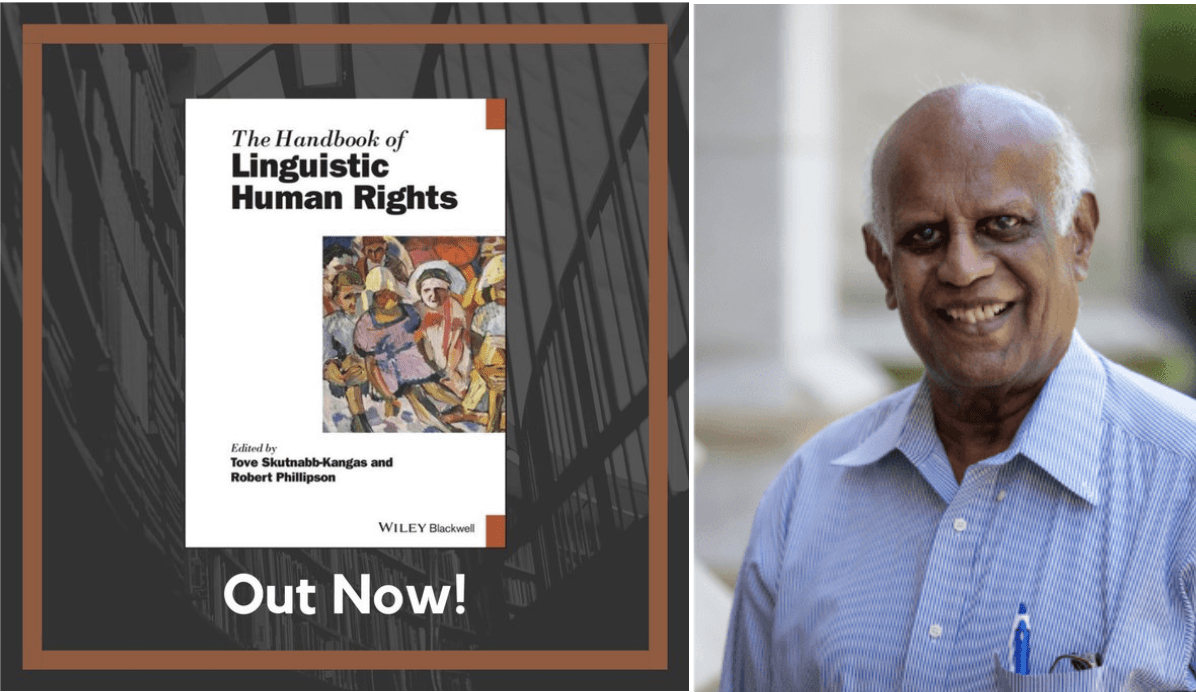Q: It was so exciting to follow all of your achievements this year. Can you tell me about what some of the highlights were for you?
This was my first year after retirement. It is well known that professors do not retire their research at the stroke of the clock. It is true that they do not continue their classroom contact with students, but I had a different set of students in Jerusalem and Naples with whom I read Tamil texts. They were different from some of my former students as they were researchers and had specialization in Sanskrit as well as Tamil and were interested in comparison. The comparison was new to me having had no former knowledge of Sanskrit and it was exciting.
Q: I understand that the Tamil Unit of the Center for Languages of Jawaharlal Nehru University, New Delhi has brought out a volume evaluating your Tamil language research with five chapters by leading scholars in the field of Tamil language. What does this book mean to you and to the future of Tamil language research?
I always had a concern about the younger generation of Tamil scholars in India absorbing critically the research findings and research methods of the scholars of previous generations. The concern is more when the senior scholars’ publications are not in Tamil. I hope this book and its evaluation in Tamil of my research on Tamil being published in English helps the current students of Tamil in Indian Universities ask critical questions of the research, including the research methodology of the previous generation. The book gives me satisfaction because it builds a bridge between the old and the new scholars.
Q: The center says, “the goal of the publication is to critically introduce the research methodology and contributions of senior scholars to the younger generation of Tamil researchers.” What advice or wisdom would you give to the young scholars for whom this book is intended?
The current dominant research paradigm of Tamil is built on the ideology of Tamil nationalism. This encourages the desire to prove the antiquity and independence of Tamil in relation to other languages of the Indian subcontinent. This trend has the risk of orienting the research towards subjectivity. I hope my research shows to the younger scholars that objective research about one’s mother tongue is possible and is necessary. I also hope that they are able to gain in their search an understanding of the past and present of Tamil and to how Tamil functioned and functions in the mix of other languages and literatures.
Q: Congratulations on your chapter “Judicial Interpretations of the Laws to Safeguard Linguistic Minorities in India” in the four-part Handbook of Linguistic Human Rights, which was released last month (December 2022). Can you tell me about this publication and the focus of your contribution?
As a linguistic researcher (my Ph.D. is in Linguistics from this University!), besides being a researcher of Tamil, I have long worked on the sociolinguistic aspects of Tamil and other languages of India. This work centers around language diversity and multilingualism as well as language problems and language policy. This paper falls in this realm. The Handbook with chapters from 62 scholars from around the world, is about language policies, and absence of policies, concerning the right to use one’s mother-tongue in public domains in a number of countries around the world. The idea of Linguistic Human Rights is larger and newer than Language Rights (which is about property rights). In its essence, it is about eliminating discrimination of the use of one’s mother tongue (mostly in reference to minorities and the minoritized) in the course of their exercise of their human rights. This sub-field is predicated on law, judiciary and international covenants. My chapter is on how Indian courts dealt with this question in specific cases and how their interpretation of the Fundamental Rights and the duties of the State enshrined in the Constitution bear on their judgements of language use.
Q: I know you have been able to travel to many places to present your work. What are some of your most notable memories from the workshops you presented and participated in this year?
The happiness I have is that my mind is not aged enough to prevent having new thoughts and sharing them and that my body is not too aged to prevent travels (January 27 is my 85th birthday!) to take my thoughts beyond shores and the recognition that knowledge has no national borders and that there are people everywhere willing to learn. I have gratitude for the possibility, given by the flexibility over time in retirement, of combining the pleasure of seeing new places and people at leisure with the excitement of facing new academic questions from unencountered corners.
Q: How has your membership with COSAS helped you over the course of your recent projects and successes?
My involvement with COSAS gives me the confidence that my academic life has not passed me. Having the members’ achievements reported regularly on this site as a frame of reference, I invigorate myself to complete the writing projects in the anvil relating to the grammar of modern Tamil and the classical theory of Tamil literature.
Congratulations to Dr. Annamalai on all his achievements. For more information about his career, please view his first interview with Dr. Costas Nakassis following his retirement here.
